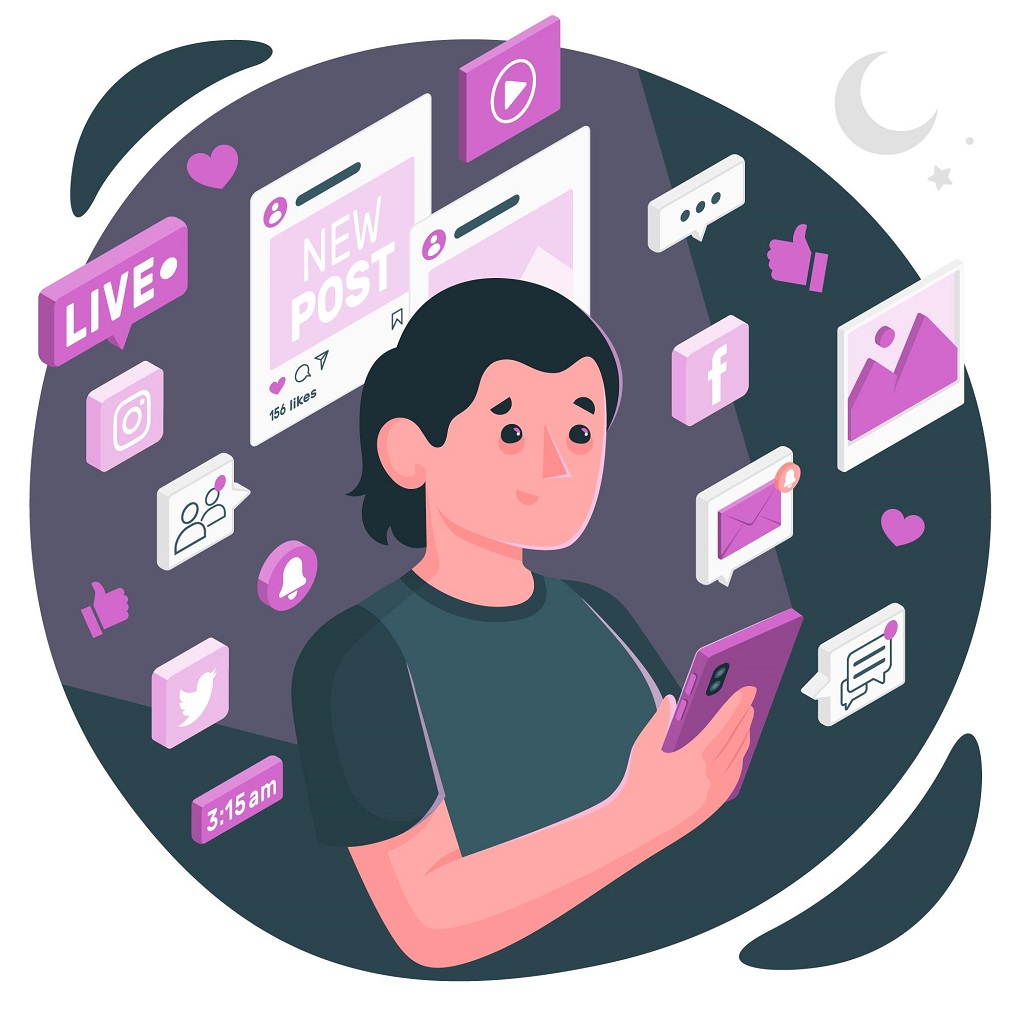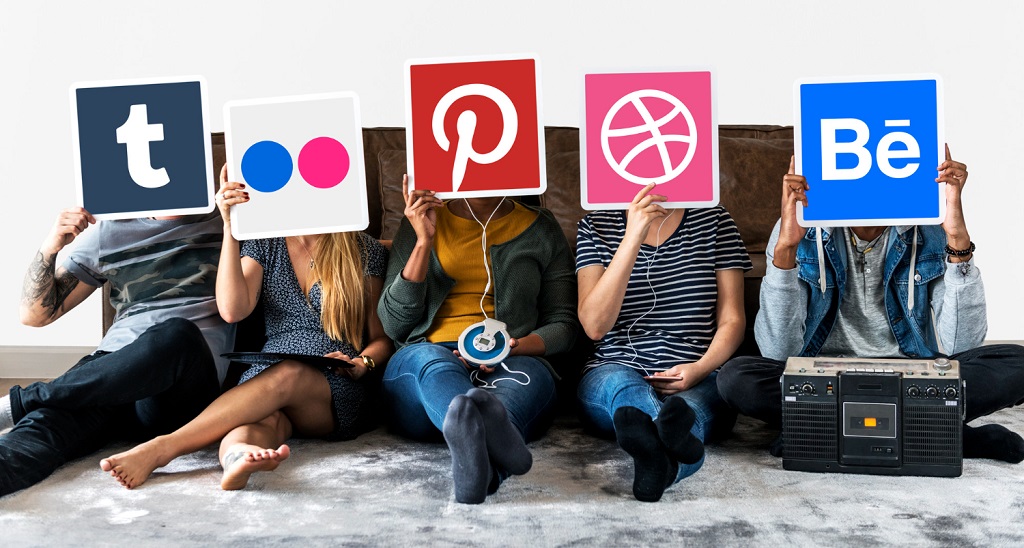Social media has become an integral part of our daily lives, revolutionizing the way we communicate, connect, and share information. It encompasses a vast array of online platforms and applications that enable individuals to interact with one another, build communities, and express themselves. Social media is essentially a virtual space where people can create, share, and exchange user-generated content, such as photos, videos, and thoughts. It serves as a medium for individuals to stay updated on current events, follow their favorite celebrities, and engage with brands and businesses. From popular platforms like Facebook, Instagram, and Twitter to emerging ones like TikTok and Snapchat, social media offers a diverse range of features and functionalities that cater to different interests and preferences. It has transformed the way we communicate by providing instant and real-time interactions, allowing users to connect with friends, family, and even strangers from around the world. Moreover, social media acts as a powerful tool for self-expression, enabling individuals to showcase their talents, voice their opinions, and advocate for causes they believe in. It has democratized the dissemination of information, as anyone can become a content creator and share their perspectives with a global audience. Additionally, social media has also become a hub for businesses and brands, offering them a platform to engage with their target audience, advertise their products or services, and build brand loyalty. The influence of social media on society is undeniable, as it has the power to shape opinions, drive conversations, and even spark social movements. However, it is important to use social media responsibly and critically evaluate the information we encounter, as misinformation and false narratives can spread rapidly. Overall, social media has transformed the way we connect, communicate, and share, playing a significant role in our digital age.

How Social Media Originated and Evolved
Social media has become an integral part of our lives, but have you ever wondered about its origins and evolution? The roots of social media can be traced back to the early 2000s when platforms like Friendster, MySpace, and LinkedIn laid the foundation for what was to come. These platforms were primarily used for connecting with friends, creating online profiles, and sharing personal information. However, it was the emergence of Facebook in 2004 that truly revolutionized the way we interacted and communicated online. With its user-friendly interface and innovative features, Facebook quickly gained popularity and became the blueprint for future social media platforms. Over time, social media has evolved from purely connecting individuals to an influential tool for businesses, a platform for self-expression, and a catalyst for social and political movements.
As social media continued to develop, new platforms emerged to cater to specific needs and demographics. Twitter, with its 280-character limit, became the go-to platform for real-time updates, breaking news, and engaging conversations. Instagram, on the other hand, focused on visual content, allowing users to share photos and videos with their followers. These platforms allowed people to express themselves creatively, gain followers, and build communities around shared interests. They provided a space for individuals to showcase their talents, hobbies, and unique perspectives, leading to the rise of influencers and content creators who have become influential figures in various industries.
The evolution of social media also brought forth the concept of viral content. Memes, viral challenges, and videos have become cultural phenomena, spreading rapidly across platforms and captivating millions of users. The power of viral content lies in its ability to create a sense of unity, humor, or outrage, connecting people from diverse backgrounds and sparking conversations. This evolution has transformed social media into a platform where individuals can have a significant impact on society, whether by raising awareness about important issues or mobilizing communities to support a cause.
Additionally, social media has revolutionized the way businesses operate and engage with their customers. Platforms like Facebook, Instagram, and LinkedIn provide targeted advertising opportunities, allowing businesses to reach their desired audience with precision. Social media marketing has become an essential element of any successful business strategy, enabling companies to build brand awareness, engage with customers, and drive sales. Moreover, the emergence of e-commerce platforms within social media has transformed the way we shop, making it easier than ever to discover and purchase products directly from our favorite brands.
However, the evolution of social media has not been without challenges. The spread of misinformation, cyberbullying, and privacy concerns have become intricate issues associated with these platforms. The rapid dissemination of unverified information can lead to a distortion of facts and incite panic or confusion. Social media platforms have had to implement measures to combat fake news and ensure the safety of their users. Despite these challenges, social media continues to evolve and adapt, with platforms implementing stricter policies, fact-checking mechanisms, and community guidelines to maintain a safer and more reliable environment.
In conclusion, social media has come a long way since its inception. It has evolved from simple online networking platforms to powerful tools that shape our daily lives. Social media has connected individuals, facilitated self-expression, and empowered businesses. Its impact on society is undeniable, and as technology advances, social media will undoubtedly continue to evolve, adapt, and shape the way we communicate and interact with the world around us.
Types
Types refer to various categories or classifications that exist within a particular subject or domain. They serve as a means to differentiate and categorize entities based on their distinctive characteristics or attributes. In almost every aspect of life, we encounter different types that allow us to better understand and navigate the world around us. For instance, in the field of science, types are essential in classifying organisms into different kingdoms, phyla, and species, enabling scientists to study and comprehend the immense diversity of life forms on Earth. Similarly, in the realm of technology, types play a crucial role in categorizing devices, software, and applications, helping users choose the most suitable option based on their needs and preferences. In essence, types provide a framework for organizing, classifying, and making sense of the countless complexities that surround us.

Benefits
Benefits can be seen as the positive outcomes or advantages that result from a certain action or situation. They serve as the rewards or gains that individuals or groups can experience, providing them with valuable improvements in various aspects of their lives. Benefits can range from physical and mental well-being to financial prosperity and personal growth. For instance, engaging in regular exercise offers a multitude of benefits such as increased strength, improved cardiovascular health, and enhanced mood. Similarly, pursuing higher education can yield benefits such as expanded knowledge, improved job prospects, and a greater sense of fulfillment. Furthermore, benefits can extend beyond the individual level to encompass societal advantages, such as improved infrastructure leading to smoother transportation and enhanced quality of life for communities. Ultimately, the presence of benefits in any context fosters progress, development, and overall improvement, making them an essential aspect of our daily lives.
Top Social Media Sites
Social media has revolutionized the way we communicate and connect with others across the globe. With the rise of technology, numerous social media platforms have emerged, each catering to different interests and preferences. One such platform that has gained immense popularity is Facebook. Boasting over 2.8 billion monthly active users, Facebook offers a wide range of features such as sharing photos, videos, and updates, as well as connecting with friends, family, and even businesses. Another notable social media site is Instagram, which primarily focuses on visual content, allowing users to post and engage with photos and videos. Instagram’s user base has steadily grown, surpassing the one billion mark, making it a hub for influencers, businesses, and creative individuals looking to showcase their talents. Additionally, Twitter, with its unique microblogging concept, allows users to express their thoughts and opinions in short messages known as tweets. With approximately 330 million monthly active users, Twitter has become a go-to platform for real-time news updates, trending topics, and engaging conversations.
Furthermore, LinkedIn has established itself as the leading professional networking platform, connecting professionals from various industries and allowing them to showcase their skills, experience, and accomplishments. It serves as a virtual resume, creating opportunities for job seekers, recruiters, and businesses to connect and collaborate. Additionally, YouTube, known as the world’s largest video-sharing platform, allows users to upload, watch, and engage with a vast array of videos. From tutorials to music videos and vlogs, YouTube has transformed the entertainment industry, giving rise to a new generation of content creators and influencers.
Snapchat is another prominent social media site, known for its ephemeral nature, with messages and stories disappearing after a short period. This feature makes it appealing to younger audiences who value privacy and enjoy sharing their daily experiences through photos and videos. Furthermore, Pinterest provides a unique platform for users to discover and save visual content, including images, infographics, and tutorials. It serves as a virtual inspiration board, attracting users interested in fashion, home decor, cooking, and various other hobbies.
It is worth mentioning that TikTok has recently skyrocketed in popularity, particularly among younger generations. This platform allows users to create and share short, creative videos, often accompanied by music or audio clips. TikTok’s addictive nature has led to viral trends, dance challenges, and a vibrant community of content creators, making it a hub for entertainment and creativity.
In conclusion, social media sites have become an integral part of our daily lives, providing platforms for self-expression, connection, and entertainment. From the vast array of options available, Facebook, Instagram, Twitter, LinkedIn, YouTube, Snapchat, Pinterest, and TikTok stand out as top social media sites, each with its unique features and user base. These platforms continue to evolve, shaping the way we interact, share information, and build communities in the digital age.
